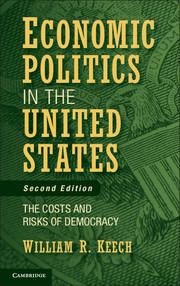Book contents
- Frontmatter
- Contents
- List of Figures and Tables
- Preface to the Second Edition
- Preface to the First Edition
- Part One Introduction
- 1 Macroeconomic Politics and the Costs and Risks of Democracy
- 2 Macroeconomic Theories and Their Political Implications
- Part Two Models of Macroeconomic Politics in a Democracy
- Part Three The Sources and Authority of Macroeconomic Goals
- Part Four Institutions and Processes
- Part Five Conclusion
- References
- Index
- References
2 - Macroeconomic Theories and Their Political Implications
Published online by Cambridge University Press: 05 June 2014
- Frontmatter
- Contents
- List of Figures and Tables
- Preface to the Second Edition
- Preface to the First Edition
- Part One Introduction
- 1 Macroeconomic Politics and the Costs and Risks of Democracy
- 2 Macroeconomic Theories and Their Political Implications
- Part Two Models of Macroeconomic Politics in a Democracy
- Part Three The Sources and Authority of Macroeconomic Goals
- Part Four Institutions and Processes
- Part Five Conclusion
- References
- Index
- References
Summary
The purpose of this chapter is to present to the reader the theories and the views of professional economists about how the macroeconomy works. Political choices regarding monetary and fiscal policy operate in an environment of real-world constraints; to understand the political choices and their consequences, we must understand the nature of these constraints.
As this chapter will show, macroeconomists have had divergent views about how the economy works, but there has been some convergence. For some, this convergence has survived the financial crisis of 2007–9. For others, macroeconomic training in recent decades has been “a costly waste of time” (“The Other-Worldly Philosophers,” Economist, July 18, 2009, p. 65). The recent crisis is seen both as a criticism and a vindication of the efficient markets hypothesis, which holds that prices of securities fully reflect all available information. And although there is some convergence as well as continued divergence in macroeconomic thinking, neither trend includes a prominent development in the discipline, behavioral economics, which has recently addressed macroeconomic issues.
Theoretical convergence or not, there is little agreement among macroeconomists on the causes of the recent financial crisis, what policies contributed to it, who is responsible, what to do to get out of the ensuing recession, and how to avoid future crises. Still, we must go to macroeconomic theory to understand the way the economic world works, to explain and predict, and to know what is possible and what is not. For better or worse, the message of this chapter is that no single, authoritative, uncontested theory explains the way the macroeconomic world works.
- Type
- Chapter
- Information
- Economic Politics in the United StatesThe Costs and Risks of Democracy, pp. 25 - 54Publisher: Cambridge University PressPrint publication year: 2013



